Related Research Articles

The violoncello ( VY-ə-lən-CHEL-oh, Italian pronunciation:[vjolonˈtʃɛllo]), normally simply abbreviated as cello ( CHEL-oh), is a middle pitched bowed (sometimes plucked and occasionally hit) string instrument of the violin family. Its four strings are usually tuned in perfect fifths: from low to high, C2, G2, D3 and A3. The viola's four strings are each an octave higher. Music for the cello is generally written in the bass clef, tenor clef, alto clef and treble clef used for higher-range passages.

The double bass, also known as the upright bass, the acoustic bass, the bull fiddle, or simply the bass, is the largest and lowest-pitched chordophone in the modern symphony orchestra. Similar in structure to the cello, it has four or five strings.

In musical instrument classification, string instruments, or chordophones, are musical instruments that produce sound from vibrating strings when a performer plays or sounds the strings in some manner.

Pizzicato is a playing technique that involves plucking the strings of a string instrument. The exact technique varies somewhat depending on the type of instrument:

The term string quartet refers to either a type of musical composition or a group of four people who play them. Many composers from the mid-18th century onwards wrote string quartets. The associated musical ensemble consists of two violinists, a violist, and a cellist. The double bass is almost never used in the ensemble mainly because it would sound too loud and heavy.

Helmut Friedrich Lachenmann is a German composer of contemporary classical music. Associated with the "instrumental musique concrète" style, Lachenmann is alongside Wolfgang Rihm as among the leading German composers of his time.
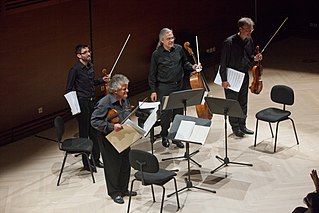
The Arditti Quartet is a string quartet founded in 1974 and led by the British violinist Irvine Arditti. The quartet is a globally recognized promoter of contemporary classical music and has a reputation for having a very wide repertoire. They first became known taking into their repertoire technically challenging pieces. Over the years, there have been personnel changes but Irvine Arditti is still at the helm, leading the group. The repertoire of the group is mostly music from the last 50 years with a strong emphasis on living composers. Their aim from the beginning has been to collaborate with composers during the rehearsal process. However, unlike some other groups, it is loyal to music of a classical vein and avoids cross-genre music. The Quartet has performed in major concert halls and cultural festivals all over the world and has the longest discography of any group of its type. In 1999, it won the Ernst von Siemens Music Prize for lifetime achievement, being the first and only group to date to receive this award.
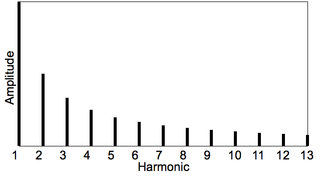
In music, inharmonicity is the degree to which the frequencies of overtones depart from whole multiples of the fundamental frequency.
A variety of musical terms are encountered in printed scores, music reviews, and program notes. Most of the terms are Italian, in accordance with the Italian origins of many European musical conventions. Sometimes, the special musical meanings of these phrases differ from the original or current Italian meanings. Most of the other terms are taken from French and German, indicated by Fr. and Ger., respectively.
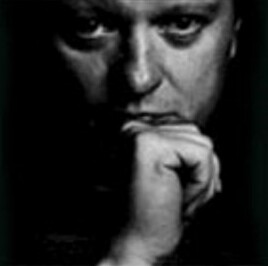
Philippe Manoury is a French composer.
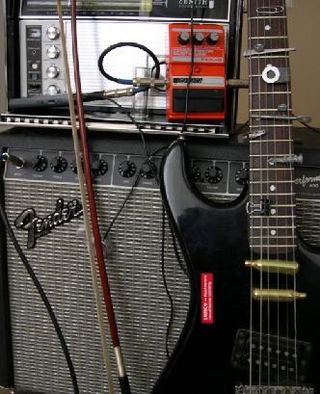
In music, extended technique is unconventional, unorthodox, or non-traditional methods of singing or of playing musical instruments employed to obtain unusual sounds or timbres.
Philippe Boesmans was a Belgian pianist, composer and academic teacher. He studied to be a pianist at the Royal Conservatory of Liège, and was self-taught as a composer, influenced by the Liège Group of Henri Pousseur, André Souris, and Célestin Deliège, and by attending the Darmstädter Ferienkurse. He worked for the Radio Télévision Belge de la Communauté Française (RTBF) from 1961, as a producer from 1971.
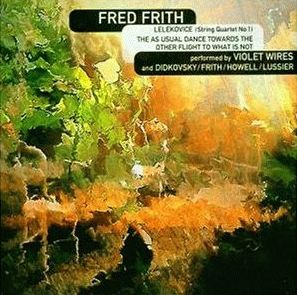
Quartets is a 1994 studio album by English guitarist, composer and improvisor Fred Frith. It consists of two compositions by Frith, "Lelekovice, String Quartet #1", performed by the Violet Wires String Quartet, and "The As Usual Dance Towards the Other Flight to What is Not", performed by an electric guitar quartet. Frith performs with the guitar quartet, but not with the string quartet.
Michel Paul Philippot was a French composer, acoustician, musicologist, aesthetician, broadcaster, and educator.
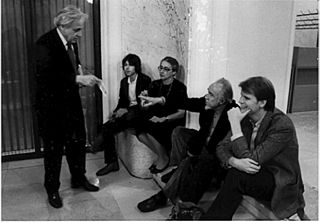
The International Society for Contemporary Music (ISCM) is a music organization that promotes contemporary classical music.
String instruments are capable of producing a variety of extended technique sounds. These alternative playing techniques have been used extensively since the 20th century. Particularly famous examples of string instrument extended technique can be found in the music of Krzysztof Penderecki, Witold Lutosławski, George Crumb, and Helmut Lachenmann.
Rebecca Saunders is a London-born composer who lives and works freelance in Berlin. In a 2017 Classic Voice poll of the greatest works of art music since 2000, Saunders' compositions received the third highest total number of votes (30), surpassed only by the works of Georg Friedrich Haas (49) and Simon Steen-Andersen (35). In 2019, writers of The Guardian ranked Skin (2016) the 16th greatest work of art music since 2000, with Tom Service writing that "Saunders burrows into the interior world of the instruments, and inside the grain of Fraser's voice [...] and finds a revelatory world of heightened feeling."

Founded in 2006, the Quatuor Béla is composed of four French musicians, graduates of the Conservatoire de Paris (CNSM): Julien Dieudegard, Frédéric Aurier, Julian Boutin, and Luc Dedreuil.
Hans Thomalla is a German-American composer, who has resided in the United States since 2002.
References
- ↑ Écrits et Entretiens – Sur mon Deuxième Quatuor à cordes, éditions Contrechamps, 2009.
- 1 2 3 François Bohy. "Reigen seliger Geister" (work details) (in French and English). IRCAM. Program note for Festival d'automne à Paris .